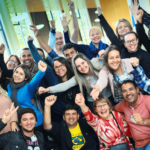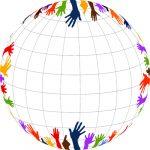
Sanna Ryökkynen, Päivi Pynnönen & Carita Cruz
Education is a basic building block of every society. According to the Human Rights Declaration (Unesco, 1948), “Everyone has the right to education.” Education is more than a right; it is a passport to human development, opening new opportunities and enhancing individual and societal autonomy and freedom. Adopting appropriate pedagogical approaches, methods, and mindsets is essential to providing inclusive learning paths for diverse students.
Inclusion is a global agenda
Thirty years ago, the World Conference on Special Needs Education in Salamanca (Unesco, 1994) introduced the idea of inclusive education. This concept, now a global agenda and a political objective within education, has united educators and policymakers worldwide. The endorsement of this movement by organisations such as the United Nations (2015) and the European Commission/European Education and Culture Executive Agency (2022, 2023) underscores the global support for inclusive education. Even in the face of challenging social conditions, Somalia and Somaliland have introduced their policy guidelines for special needs education (The Federal Government of Somalia, 2018; The Republic of Somaliland, 2012), making them part of this larger movement.
In Somalia, internal conflicts have continued for decades, which has caused the fragmentation of the state. This has also affected the availability and quality of education. During the Civil War, more than three-quarters of the schools were lost, and there was a shortage of qualified teachers. Because of this, many Somalis could not go to school or develop their professional skills. Furthermore, the current technical and vocational education and training (TVET) system is unable to provide students with modern vocational skills. Somalia’s TVET system is fragmented, and teaching is based on outdated curricula. Teaching activities do not meet the needs of the labour market and are not demand-oriented either. There are also too few qualified teachers. Education in Somalia is undergoing major changes, and significant progress has been made in improving access to quality education. (World Bank, 2019). There is a strong will to develop and enhance society, education, and the labour market, enabling equal opportunities for all.
The Finnish Somalia Network (FSN) is an umbrella organisation for development cooperation in Somalia and the Horn of Africa. It is an ideologically, politically, and religiously independent organisation which promotes peace and development in the region. One of FSN’s efforts is to coordinate collaborative, multistakeholder projects (Kaabe, Himilo, and Kobciye), which aim to tackle the high rates of youth unemployment and the shortage of TVET opportunities in Somaliland and Puntland. The development goal is for youth and vulnerable groups, and persons with disabilities in particular, to get quality skills and education, livelihood, and opportunities in life. The projects aim to promote and demonstrate equal rights to education and jobs for all. Vulnerable groups – different kinds of learners, inclusive education, and persons with disabilities are given particular focus by developing courses that address the barriers to accessibility.
A training process to increase the inclusion competence of TVET teachers
The projects started in the spring of 2023, and the last year will be 2026. As part of this effort, the HAMK Edu research unit at Häme University of Applied Sciences (HAMK) provided inclusive pedagogical training, which began in the spring of 2023 and continued until the spring of 2024. Pedagogical training aimed to increase TVET teachers’ inclusive pedagogical competence. The participants in the pedagogical training were nine TVET teachers, known as pedagogical experts, from nine different locations. These experts then applied our training materials and methods to help build the capacity of local TVET teachers. The number of local TVET teachers who gained the pedagogical training organised by the pedagogical experts varied. Some trainers worked with two local TVET teachers, and others invited a group of TVET teachers to their training sessions. Also, the number of local workshops varied, but each pedagogical expert organised at least six local workshops.
At the beginning of the training, we created a shared understanding of diversity, equality and inclusion with our pedagogical experts. During the training, the pedagogical experts established course plans based on student-centred teaching, a positive attitude, and a classroom where students are welcome. Following the participants’ wishes, the online meeting also focused on student guidance, self-direction, problem-based learning and assessment strategies. Learning disabilities, social-emotional learning, respect and fairness were essential topics in our training.
Insights and key takeaways of the pedagogical training
This unique pedagogical training, with Somalian pedagogical experts and HAMK teacher trainers, was filled with significant moments, including sixteen online training sessions organised by HAMK once or twice a month. A pivotal venue for both HAMK’s trainers and Somalian pedagogical experts was a three-day in-person workshop in Addis Ababa, Ethiopia, in November 2023, which allowed us to strengthen the connection and collaboration between stakeholders. We also organised bilateral online meetings with the pedagogical experts to better understand individual perspectives and the progress of local TVET teacher training. The pedagogical training ended with a final online seminar in May 2024, during which we had the opportunity to review the training and hear about pedagogical experts’ experiences.
Throughout the project, we exchanged ideas and knowledge, focusing on enhancing TVET teachers’ and managers’ ability to embrace the principles of inclusion and diversity in Somalian TVET. Our goal was ambitious: to demonstrate that TVET can be a valuable and inclusive pathway, particularly for vulnerable groups, such as individuals with special needs and disabilities. In a society where TVET is not highly regarded, this kind of project advocates for the equal right to education and employment opportunities for all youth, regardless of background or ability.
According to the feedback received from the pedagogical experts, the impact of the pedagogical training has been profound. They felt that HAMK’s online sessions were helpful in their organisations and that they had learnt something new. The things they reported they learned during the training could be divided into two categories: 1) new conceptual understanding and 2) new pedagogical approaches and methods. They better understood concepts like inclusion, diversity and learning difficulties. Furthermore, they built up their pedagogical and didactical competence by examining the different teaching approaches and methods. The most important thing for us as teacher trainers was that pedagogical experts said they would use and apply the training sessions’ content in theory and practice in their work after the project. They also highlighted that, eventually, vocational students will benefit from the updated pedagogical competence of TVET teachers.
Expanding horizons
Of course, this adventure was not without its challenges. Limited resources and infrastructure and unexpected changes in the pedagogical experts’ daily lives presented hurdles. However, we overcame these barriers through open dialogue, patience, and, most importantly, collaboration. This collaborative spirit was the key to creating a meaningful pedagogical training that we all share.
While much has been achieved, the journey is far from over. We are committed to finding new projects and forms of collaboration to continue working with Somalian stakeholders and build on this momentum. This is not just about improving TVET—it’s about shaping a future where every young person, regardless of their background, has the opportunity to thrive. As we move forward, we invite policymakers, educators, and community leaders to join us in this mission. Together, we can ensure that TVET becomes a powerful tool for social equity, empowering the next generation of young people to contribute to their communities and society.
Authors
Sanna Ryökkynen, Principal Research Scientist (tenure track), School of Professional Teacher Education & HAMK Edu Research Unit
Päivi Pynnönen, Senior Lecturer, School of Professional Teacher Education
Carita Cruz, Senior Specialist, International RDI, HAMK Edu Research Unit
References
European Commission. (2022). Communication to the commission. A new human resources strategy for the commission. https://commission.europa.eu/system/files/2022-04/c_2022_2229_2_en_act_part1_v12.pdf
European Commission: European Education and Culture Executive Agency (EACEA). (2022). Towards equity and inclusion in higher education in Europe. Publications Office of the European Union. https://data.europa.eu/doi/10.2797/631280.
European Commission: European Education and Culture Executive Agency (EACEA). (2023). Promoting diversity and inclusion in schools in Europe. Publications Office of the European Union. https://data.europa.eu/doi/10.2797/443509.
UNESCO. (1994). Salamanca statement and framework for action on special needs education. https://unesdoc.unesco.org/ark:/48223/pf0000098427
United Nations. (1948). Universal declaration of human rights. https://www.un.org/sites/un2.un.org/files/2021/03/udhr.pdf
United Nations. (2015). Transforming our World: The 2030 Agenda for Sustainable Development. https://sdgs.un.org/sites/default/files/publications/21252030%20Agenda%20for%20Sustainable%20Development%20web.pdf
World Bank. (2019). Somalia Economic Update, Fourth Edition: Building Education to Boost Human Capital. https://urly.fi/3E2k





